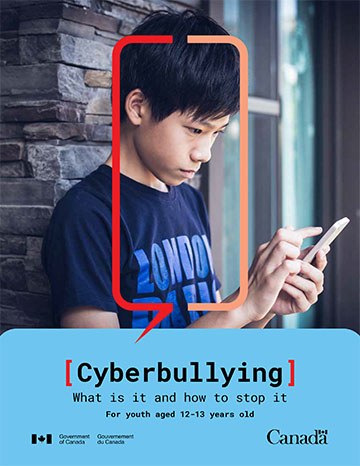Cyberbullying information for youth aged 12 – 13
What is cyberbullying?
You’ve learned about bullying and how it’s wrong. This is the same idea, except it happens online. When someone is mean or tries to threaten, hurt or embarrass someone else online, that’s cyberbullying. It can be:
- Making fun of someone or calling them names
- Sharing an embarrassing or sexual image of someone
- Spreading hurtful gossips, secrets, rumours or lies
- Excluding someone from a group chat on purpose
- Ganging up on someone in a video game
Where does it happen?
Cyberbullying can happen anywhere you talk to other people online, including:
- Social media and apps
- Multiplayer games
- YouTube and live-streaming
- Text, chat or instant messaging
How can it affect you?
Cyberbullying can be very harmful because there is no safe zone. Cyberbullying can reach you anytime and anywhere, even at the dinner table or in the privacy of your bedroom — and can quickly be seen by a lot of people. It can make someone:
- Feel alone, sad, scared, frustrated, or angry
- Feel badly about themselves, their friendships, and their lives
- Want to avoid school, public places, and activities
- Harm themselves
How to protect your online reputation
What is an online reputation?
Just like your reputation at school or home, your online reputation is how other people see and think of you based on what you say and do.
How is it formed?
When you are online, you leave a record of what you do and say for others to see. Things that can form your online reputation include:
- The stories, videos and pictures you post or share with others
- What you like or dislike and agree or disagree with
- Comments and posts you make about yourself and others
- Comments and posts other people make about you
How can it affect you?
If your online reputation is good, it can help you find friends, connections and future opportunities. On the other hand, if it includes mean, hurtful or embarrassing things, it can:
- Make others think less of you
- Make you feel alone or that others don’t like you
- End or change your friendships
- Open the door to mean comments or cyberbullying
- Limit your future opportunities
How can you protect it?
There are many ways to improve and protect your online reputation, including:
- Think twice before you post: Is what you are saying, showing, liking or sharing going to make fun of, hurt, or be mean to yourself or someone else?
- Assume everyone will see it: What you put on the internet may not stay private, so how would you feel if your friends, parents or teachers saw it?
- Protect your privacy: Use privacy settings on social media and don’t share your passwords with anyone
- Know who your friends are: Be careful who you accept, shorten your friends list and restrict access for friends of friends and the public
- Build a positive presence: Make your posts and comments empowering or encouraging, or about a cause or subject you are passionate about
- Ask for help: If you made a mistake or are worried, feel threatened or are being cyberbullied, talk to your parents or another adult you can trust
Booklet
Cyberbullying booklet for youth ages 12-13
Find additional information in this booklet for youth aged 12-13
